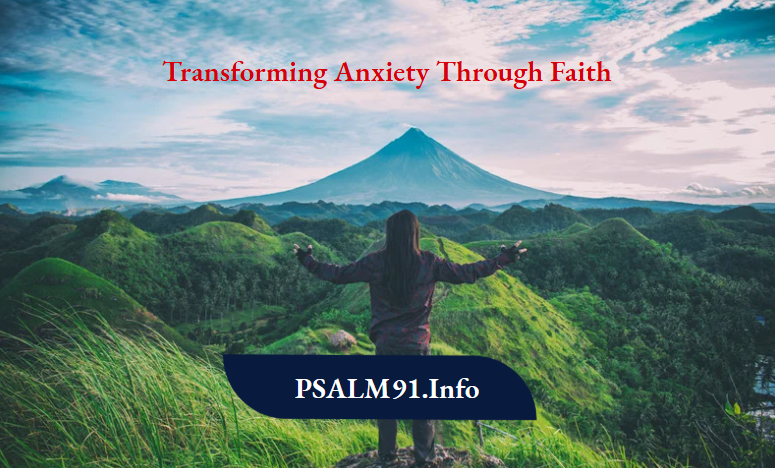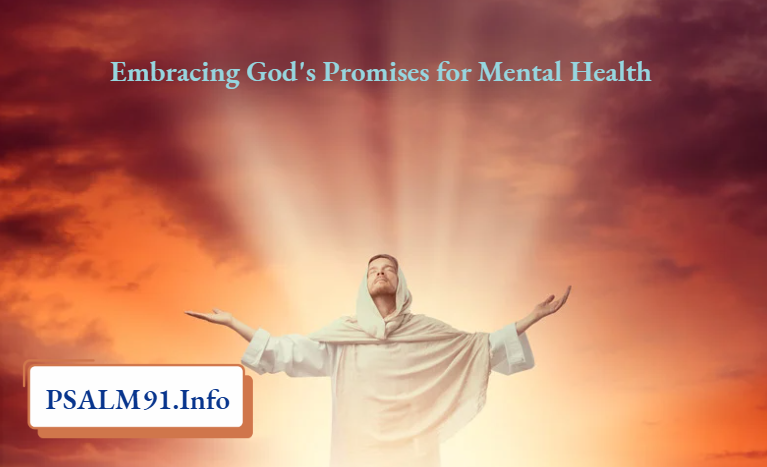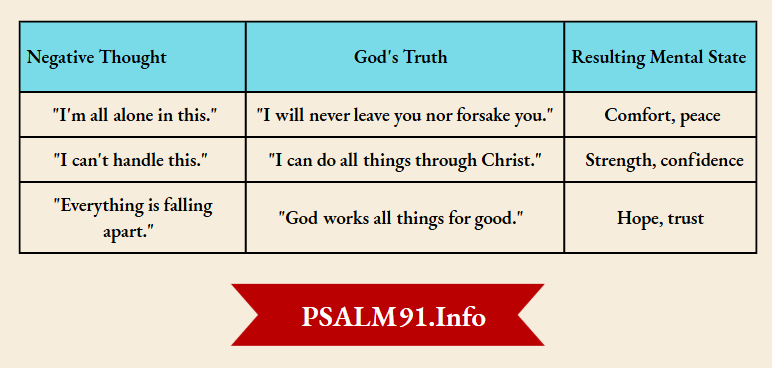Finding Peace in Uncertainty: Psalm 91 for Mental Health and Anxiety
In a world filled with uncertainty and anxiety, many of us are searching for peace. Psalm 91 offers a comforting reminder of God’s presence and protection, showing us how to find solace in His promises. This article explores how embracing the teachings of Psalm 91 can help transform our mental health and alleviate anxiety, guiding us towards a more peaceful state of mind.
Finding Peace in Uncertainty
- Psalm 91 emphasizes God’s unwavering protection and presence, which can bring comfort in times of distress.
- Trusting in God’s sovereignty allows us to let go of worries and embrace peace amidst life’s uncertainties.
- Practicing gratitude shifts our focus from problems to blessings, fostering a more positive mindset.
- Daily prayer and meditation on Scripture can help cultivate inner tranquility and a peaceful heart.
- Building resilience through faith can empower us to face fears and anxieties with confidence.
Psalm 91 For anxiety
Finding Refuge in God’s Presence
Understanding Psalm 91:1-2
Psalm 91:1-2 offers a powerful image of God as our protector. It speaks of dwelling in the shelter of the Most High and finding rest in the shadow of the Almighty. It’s about more than just knowing about God; it’s about truly living in His presence. I think a lot of people miss that point. It’s not enough to just read the words; you have to believe them and act on them. It’s like having a security system for your house but never turning it on. What’s the point?
The Assurance of God’s Protection
God’s protection isn’t just a nice idea; it’s a promise. It’s easy to feel scared when bad things happen, but the Bible tells us we can trust God to keep us safe. It’s like Avery’s story, where he survived a car accident with minor injuries, attributing his safety to God’s protection from Psalm 91, highlighting the power of faith. This doesn’t mean nothing bad will ever happen, but it does mean God is with us, even in the middle of the storm. Think of it like having an umbrella in the rain. It doesn’t stop the rain, but it keeps you from getting soaked.
Experiencing Rest in His Shadow
Finding rest in God’s shadow is about finding peace in the middle of chaos. It’s about knowing that even when things are crazy, God is still in control. It’s like having a secret place where you can go to be alone with God. It’s a place of peace and quiet, where you can recharge and get ready to face the world again.
It’s about nurturing a heartfelt relationship with Him. Running to God involves seeking His guidance, comfort, and protection, solidifying the belief that He is a sanctuary in times of trouble. It’s about finding your own “secret place” with God, which serves as a refuge from life’s uncertainties and emotional turmoil.
Here are some ways to find that rest:
- Spend time in prayer.
- Read the Bible.
- Listen to worship music.
Biblical Wisdom for Inner Tranquility
In our busy lives, it’s easy to feel overwhelmed. But the Bible offers some seriously practical advice for finding inner peace. It’s not about ignoring problems, but about how we approach them. Let’s look at some ways to cultivate a calmer mind using biblical principles.
Trusting in God’s Sovereignty
It can be hard to let go, but trusting that God is in control can really ease anxiety. When we try to manage everything ourselves, we end up stressed and exhausted. Instead, try to actively give your worries to God, trusting that He knows what’s best. It’s like handing over the steering wheel and letting someone who knows the road drive.
Practicing Gratitude
It’s easy to focus on what’s going wrong, but taking time to appreciate what’s going right can shift your perspective. Try keeping a gratitude journal and writing down three things you’re thankful for each day. It could be something as simple as a sunny day or a kind word from a friend. Shifting your focus to gratitude can help you Cultivate a habit of peacefulness.
Finding Peace In Uncertainty Bible Verse
Renewing Your Mind with Scripture
What we think about really affects how we feel. If we’re constantly dwelling on negative thoughts, we’ll feel anxious and down. But we can actively change our thought patterns by filling our minds with God’s truth. This means reading the Bible regularly and meditating on its teachings. It’s like reprogramming your brain with positive, life-giving messages.
Replacing negative thoughts with positive ones is a game changer. It’s not always easy, but it’s worth the effort. Start small, maybe with one verse a day, and let God’s word transform your thinking.

Facing Fears with Scripture
It’s easy to let anxiety take over, but faith offers a powerful way out. Facing your fears head-on with the strength of scripture can really change things. Think of it like Cathy Stewart, who read Psalm 91 every night and found real strength in God’s promises. It’s about deciding that you won’t let fear run your life anymore, and instead, you’ll turn to verses that give you power, like Philippians 4:13. Each time you push back against worry, you’ll feel stronger, realizing that trusting in God brings peace and builds your ability to handle whatever life throws at you. Understanding the roots of fear is also important. Fear can be inherited and normalized. Identifying irrational fears and seeing worry as a misplaced sense of control is key.
The Power of Daily Affirmations
Daily affirmations can be a game-changer when you’re battling anxiety. It’s not just about saying nice things to yourself; it’s about actively choosing to believe in God’s promises and speaking them out loud.
Here’s a simple way to get started:
- Start each day with a scripture-based affirmation.
- Repeat the affirmation throughout the day.
- Write down your affirmations in a journal.
Affirmations rooted in faith can help shift your mindset from fear to trust. It’s about renewing your mind with truth and reminding yourself of God’s power and love.
Building Resilience in Uncertain Times
Life is full of surprises, and not always good ones. Building resilience isn’t about avoiding tough times, but about developing the strength to get through them with your faith intact. Resilience is like a muscle; the more you use it, the stronger it gets. anxiety disorders are increasing globally, and while therapy is crucial, Psalm 91 offers a path to lasting refuge in Jesus.
Here are some ways to build resilience:
- Focus on what you can control: Instead of getting caught up in things you can’t change, put your energy into the areas where you can make a difference.
- Practice self-care: Taking care of your physical, emotional, and spiritual needs is essential for building resilience. Make time for activities that help you relax and recharge.
- Seek support: Don’t be afraid to reach out to friends, family, or a support group when you’re struggling. Sharing your burdens with others can make a big difference.
Scriptures on God’s Comfort and Protection
The Bible is full of verses that talk about God’s comfort and protection. They’re there to give us reassurance and peace when we’re dealing with tough stuff. Let’s look at some of these verses.
Key Verses for Reassurance
There are so many verses that can bring comfort. It’s like God knew we’d need reminders of His presence and power. Here are a few that I find myself going back to:
- Psalm 46:1-3: This one is great when you feel like everything is falling apart. It reminds you that God is always there, no matter what.
- Isaiah 41:10: This verse is a personal promise from God. He’s saying, “Don’t be afraid, I’m with you.” It’s a good one to memorize.
- 2 Thessalonians 3:3: This one reminds us that God is faithful and will protect us from evil. It’s a good one when you feel vulnerable.
The Role of Prayer in Finding Peace
Prayer is essential for finding peace. It’s how we connect with God and remind ourselves that we’re not alone. It’s not just about asking for things; it’s about building a relationship.
When I’m feeling anxious, I try to spend some time in prayer. It doesn’t always make the anxiety go away completely, but it does help me feel more grounded and connected to something bigger than myself.
Psalm 91 Mental Health
Meditating on God’s Promises
Meditation isn’t just for monks or yoga instructors. It’s for anyone who wants to slow down and focus on something positive. For Christians, that means meditating on God’s promises. Here’s how I do it:
- Choose a verse that speaks to you.
- Read it slowly, several times.
- Think about what it means.
- Ask God to help you understand it.
Doing this regularly can really change your perspective and help you find peace, even when things are tough.
Cultivating a Peaceful Mind Through Prayer and Meditation
Establishing a Daily Prayer Routine
It’s easy to let the day slip away without connecting with God, but setting aside specific time for prayer can make a huge difference. Think of it as scheduling an appointment you can’t miss. Start small, maybe just 10-15 minutes each morning. Find a time that works with your schedule, and stick to it as best you can. It’s okay if you miss a day here and there, just get back on track the next day. Consistency is key.
- Choose a consistent time.
- Find a quiet place.
- Set a reminder on your phone.
Prayer doesn’t have to be complicated. It’s simply talking to God, sharing your thoughts, feelings, and needs. Don’t worry about saying the “right” words; just be honest and open with Him.
Incorporating Meditation on Scripture
Meditation isn’t just for monks in faraway lands; it’s a powerful tool for anyone seeking inner peace. Instead of emptying your mind, Christian meditation involves focusing on a specific Bible verse or passage. Read the verse slowly, think about what it means, and how it applies to your life. Let the words sink in and transform your thinking. It’s like marinating your mind in God’s truth.
- Select a verse that speaks to you.
- Read it slowly and repeatedly.
- Reflect on its meaning.
Finding Stillness in God’s Presence
In our busy world, stillness can feel like a luxury, but it’s essential for our mental and spiritual health. Learning to be still in God’s presence allows us to hear His voice and experience His peace. Find a quiet place where you can be alone with your thoughts. Close your eyes, take a few deep breaths, and focus on God’s presence. You might be surprised at how much calmer and more centered you feel after just a few minutes.
- Find a quiet space.
- Focus on your breath.
- Release distractions.

It’s easy to get caught up in the daily grind and forget about the bigger picture. But as people of faith, we have access to something truly special: God’s promises. These promises aren’t just nice words; they’re a lifeline to peace and strength, especially when it comes to our mental health. When life throws curveballs, remembering what God has promised can be a game-changer. It’s about actively choosing to believe and act on His Word, even when things look bleak.
Bible Verses For Anxiety And Peace
The Importance of Active Faith
Active faith isn’t just about saying you believe; it’s about living like you believe. It’s about taking God at His word and trusting that He will come through, even when you can’t see how. This means making a conscious effort to focus on His promises, even when your feelings are telling you something different. It’s like choosing to steer your ship towards a safe harbor, even when the storm is raging.
Here are some ways to put your faith into action:
- Praying specifically about your anxieties and asking for God’s guidance.
- Reading and meditating on scripture that speaks to your fears.
- Sharing your struggles with a trusted friend or mentor who can offer support and encouragement.
Aligning Your Mind with God’s Truth
Our minds can be battlefields, constantly bombarded with negative thoughts and worries. Aligning your mind with God’s truth is about intentionally replacing those negative thoughts with positive, faith-filled ones. It’s like retraining your brain to focus on what’s true and good, rather than dwelling on what’s scary or uncertain. This is where psalms for anxiety can be a great help.
Think of it as a mental reset. When a negative thought pops up, challenge it with a truth from scripture. For example, if you’re worried about the future, remind yourself that God has promised to never leave you nor forsake you (Deuteronomy 31:6).
Creating a Foundation for Lasting Peace
Lasting peace isn’t something that just happens; it’s something you build. It’s like constructing a house on a solid foundation. When the storms of life come, that foundation will keep you grounded and secure. This foundation is built on a relationship with God, rooted in prayer, scripture, and trust. It’s about consistently choosing to focus on His promises, even when it’s hard. It’s about cultivating a habit of peacefulness that can transform your everyday experience. God’s personal promise of presence, strength, and support is beautifully expressed in this verse.
Here’s a simple table to illustrate how aligning your thoughts with God’s truth can impact your mental state:

Overcoming Anxiety with Biblical Truths
Key Verses for Combatting Worry
Anxiety can feel like a heavy weight, but the Bible offers some amazing verses to help us fight it. These verses aren’t just nice words; they’re powerful truths that can change how we think and feel.
- Philippians 4:6-7 tells us not to be anxious about anything, but to pray about everything. It’s a reminder to bring our worries to God.
- 1 Peter 5:7 encourages us to cast all our anxiety on Him because He cares for us. It’s like handing over our burdens to someone who can actually handle them.
- Isaiah 41:10 says, “Do not fear, for I am with you.” This is a promise of God’s constant presence and support.
When I’m feeling overwhelmed, I often turn to these verses. It’s not a magic fix, but it helps me remember that I’m not alone and that God is in control. It’s about shifting my focus from my problems to His power.
The Importance of Casting Your Cares
Have you ever tried carrying too many things at once? It’s stressful, right? Anxiety is like that – a bunch of worries we’re trying to carry ourselves. The Bible tells us to cast our cares on God. What does that even mean?
It means actively giving our worries to Him. It’s not just saying, “Okay, God, I’m worried,” and then continuing to obsess. It’s a conscious decision to release those burdens. Think of it like this:
- Acknowledge your worry.
- Pray about it specifically.
- Trust that God is working, even if you don’t see it.
Finding Strength in Community Support
Going through anxiety alone can be incredibly tough. That’s why community support is so important. Proverbs 12:25 says, “Anxiety weighs down the heart, but a kind word cheers it up.” Sometimes, all we need is someone to listen and offer encouragement. Christain counseling can also provide a safe space to process your feelings and develop coping strategies.
Here’s why community matters:
- Shared experiences: Knowing others struggle too can be comforting.
- Accountability: Friends can encourage you to stick with healthy habits.
- Prayer support: Others can pray for you when you’re struggling.
Remember Cathy Stewart’s story. Reading Psalm 91 each evening helped her combat fear. Facing your fears can transform anxiety into faith. Envision yourself declaring, ‘I refuse to let fear control me any longer,’ as you turn to scripture that empowers you, like Philippians 4:13. Each time you resist the urge to succumb to worry, you feel your spirit uplifted, realizing that trust in God not only brings peace but cements your resilience against life’s uncertainties.
Spiritual Healing From Anxiety
Embracing Peace Through Faith
In the end, finding peace in uncertain times is all about leaning into faith. Psalm 91 reminds us that we’re not alone in our struggles. When we trust in God’s promises, we can face our fears head-on. Just like Cathy Stewart found strength in reading Psalm 91, we too can transform our anxiety into a deeper trust. It’s about making a choice every day to turn to scripture and let it guide us. So, the next time worry creeps in, remember that God’s love is always there, ready to wrap around you like a warm blanket. Embrace that comfort, and let it help you navigate through life’s storms.
Psalm 91 for Mental Health and Anxiety Frequently Asked Questions
What Does Psalm 91 Teach About Finding Peace?
Psalm 91 teaches that by trusting in God and seeking His presence, we can find peace and safety, even in uncertain times.
How can I apply Psalm 91 To My Daily Life?
You can read and meditate on Psalm 91 daily, reflecting on its promises of protection and comfort to help reduce anxiety.
What Are some ways To Practice Gratitude?
You can keep a gratitude journal, where you write down things you’re thankful for each day, helping shift your focus from worries to blessings.
How Does Prayer Help With Anxiety?
Prayer allows you to express your fears and concerns to God, providing a sense of relief and connection that can ease anxiety.
What Role Does Community Play In Overcoming Anxiety?
Being part of a supportive community can provide encouragement and help you feel less alone in your struggles with anxiety.
How Can I Renew My Mind With Scripture?
You can memorize key verses and repeat them to yourself, allowing God’s truth to reshape your thoughts and bring peace.
